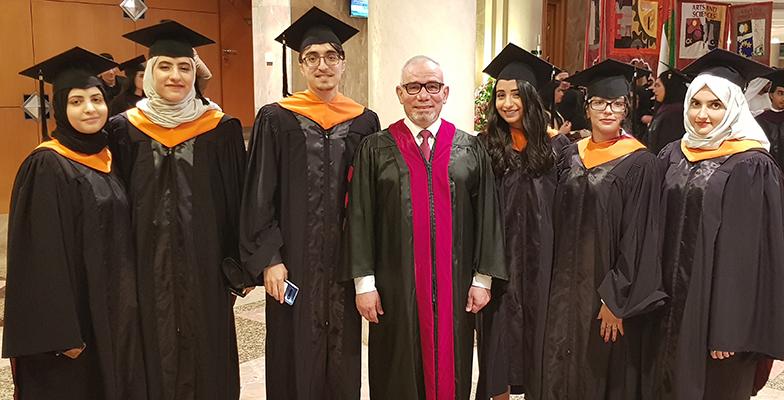- About
- Admissions
- Study at AUS
- Prospective Students
- Bachelor's Degrees
- Master's Degrees
- Doctoral Degrees
- Admission Publications
- International Students
- Contact Admissions
- Grants and Scholarships
- Sponsorship Liaison Services
- Testing Center
- New Student Guide
- File Completion
- New Student Orientation
- Payment Guide
- Executive Education
- Students with Disabilities
- Academics
- Life at AUS
- Research
- Contact Us
- Apply Now
- .

AUS graduates first cohort of biomedical engineering graduate program
As the first program of its kind in the Gulf Cooperation Council (GCC) region, the American University of Sharjah (AUS) Master of Science in Biomedical Engineering (MSBME) program saw its first batch graduate recently with the class of Spring 2019. This dynamic, multidisciplinary program was introduced to meet an increasing demand for biomedical engineers in the healthcare industry and in biomedical research and is being offered at AUS by the university’s College of Engineering (CEN) and the College of Arts and Sciences (CAS).
Of the seven students that comprised the cohort, six were women. The successful batch consists of Afifa Farooq, Aseel Dirar Alatoom, Meera Alex, Jumana Farahat, Mohanad Ahmed Alkhodari, Nour Majdi Alsawaftah and Rand Hasan Abusamra.
Speaking about her reasons for joining this unique program, Alex said:
“I was keen on pursuing a master’s degree after my bachelor’s in biomedical engineering and that’s when I heard about this about this new program on offer. I worked for a year-and-a-half after completing of my bachelor’s degree and I realized that research and academics excited me more than a job. I decided to join this program as it included research and they offered me an assistantship as well.”
The MSBME program prepares students for advanced careers and/or doctoral studies related to biomedical engineering. The university offers MSBME students teaching and research assistantships, which include stipends and tuition waivers on a competitive basis. The program accepts students from a wide variety of engineering backgrounds, including those who have earned a bachelor of science degree in biomedical, chemical, civil, computer, electrical, industrial and mechanical engineering.
Commenting on the MSBME program, Alkhodari said:
“The program was excellent in all aspects. The courses, research topics, and lab activities were all very useful to us and our professors were great supervisors helping us achieve the best outcomes during our course of study. I recommend the program to anyone who is looking for a great atmosphere in the field of biomedical engineering research. The program is multidisciplinary, which allows us to work in our area of interest while engaging with others, which adds to our experience in different fields.”
The tremendous rate of population growth in the MENA region is accompanied by a concurrent demand for and growth in healthcare services, such as hospitals, clinics, medical colleges, medical technology suppliers and biomedical engineering, which is reported to be one of the fastest growing engineering disciplines worldwide.
Dr. Hasan Al Nashash, Director of the AUS MSBME Program, stated that the program will enhance research:
"The MSBME program provides an opportunity to conduct advanced biomedical engineering research to support the efforts in combating the region's specific healthcare challenges, including serious and prevalent diseases such as diabetes, cardiovascular disease, chronic obstructive pulmonary disease (COPD), cancer, perinatal and genetic diseases."
Based on high standards similar to those followed in the United States, the AUS MSBME curriculum provides core courses in mathematics, anatomy and physiology, followed by elective courses in several biomedical engineering subdisciplines. Students can select a number of multidisciplinary areas, including healthcare operations management, planning and risk management, biomedical informatics, instrumentation, signal processing, biomaterials, drug delivery and biomechanics. These areas of study enhance the technical skills of all biomedical engineers to meet today's demands as well as those of the future.

